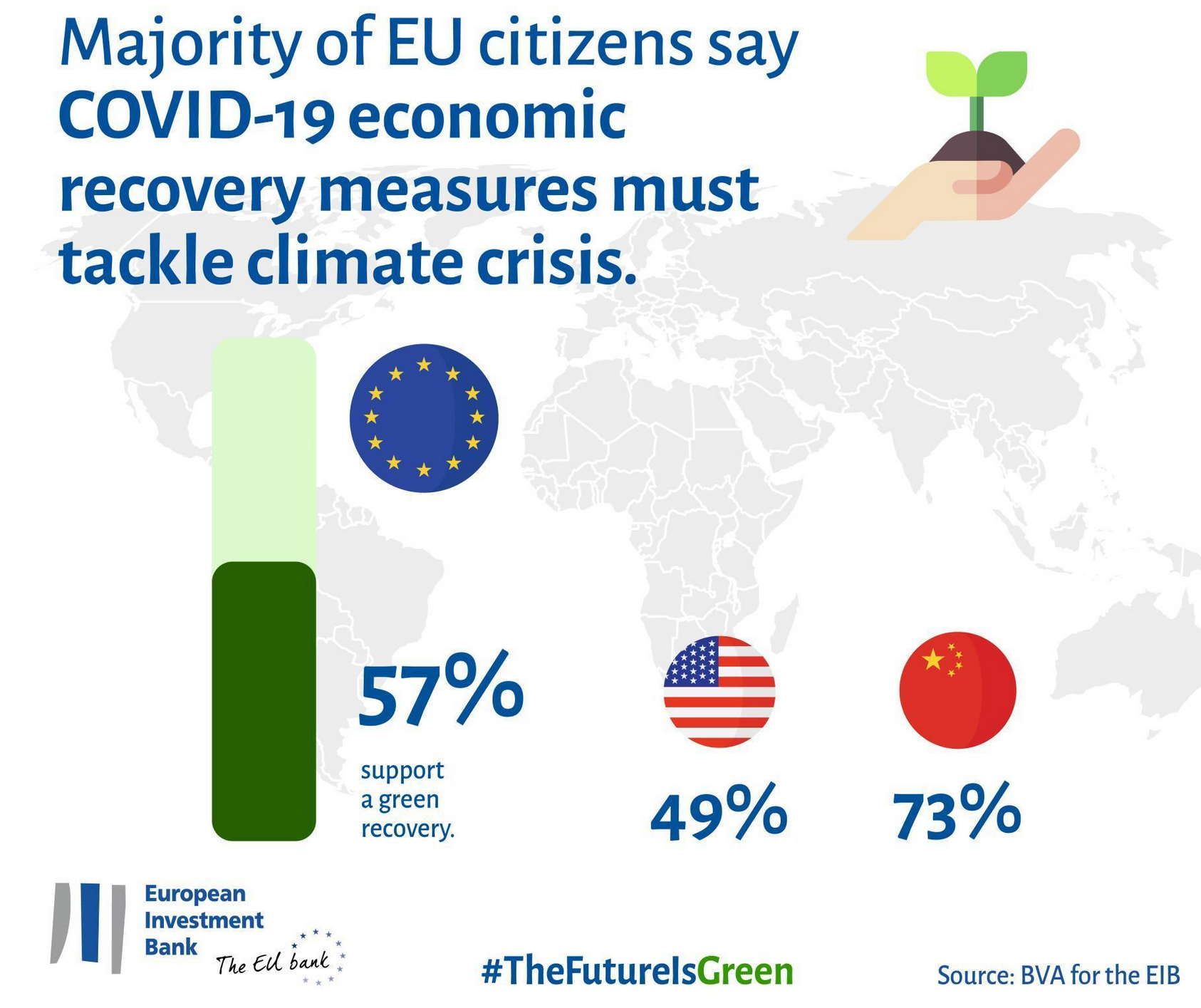Knowledge Networking Portal for Sustainable & Responsible Tourism










 EIB 2020-2021 Survey: Climate action in the face of COVID-19
EIB 2020-2021 Survey: Climate action in the face of COVID-19
Assessing citizens’ perception of climate change and expectations on climate action in the face of COVID-19
The European Investment Bank has launched the third edition of the EIB Climate Survey. This year's survey reveals how the COVID-19 crisis influences citizens’ perception of the climate emergency. The findings are particularly relevant at a time when climate and a green recovery are top priorities in the EU’s agenda.
Conducted in partnership with market research firm BVA, the survey aims to inform the broader debate on citizens’ attitudes and expectations in terms of climate action in the European Union, the United Kingdom, the United States and China.
Post-COVID-19: Europeans want a green recovery
The first part of the survey, conducted in partnership with market research firm BVA, finds that 57% of Europeans say that the post-pandemic economic recovery must take the climate emergency into account. They say their governments should promote low-carbon and climate-resilient growth.
Climate change challenge in COVID-19 world
The current health crisis has changed citizens’ perception of challenges their country is facing today. In the 2019 survey, climate change was ranked as the top challenge by Europeans (cited by nearly half of Europeans). This year, however, it is relegated to fourth place (33%). Unsurprisingly, Europeans name the COVID-19 pandemic as the greatest challenge currently facing their country (72%). The pandemic ranks first in all European countries, with levels ranging from 57% (Hungary) to 86% (Malta).
This is also the case in the United States (73%), where health concerns were already the top-ranked challenge last year, and in the UK (77%). The only exception is China: Chinese people still place climate change as first in their list of challenges (61%), slightly ahead of the pandemic (59%).
The survey reveals that beyond the health issues linked to COVID-19, Europeans and Americans are very concerned by the economic and social consequences of the pandemic. In Europe, unemployment (41%) and a financial crisis (37%) are named as the two other major challenges, both of which are ranked ahead of climate change (33%). In the United States, the top three challenges – the COVID-19 pandemic (73%), unemployment (37%) and a financial crisis (34%) – are the same as in Europe.
Support for a green recovery
However, though the pandemic appears to be Europe's major challenge today, it is not a reason to overlook the climate issue. As found in the 2019 survey, a large majority of citizens – whether in Europe (75%), China (94%) or the United States (72%) – say that climate change has an impact on their everyday lives.
In fact, a majority of Europeans (57%) say that the economic recovery must take the climate emergency into account. They believe their government should promote low-carbon and climate-resilient growth. Only 43% would prefer their government to boost the economy by any means in order to return to economic growth as soon as possible.
What are you ready to give up to fight climate change?
The second part of the survey, conducted in partnership with market research firm BVA, finds that although most respondents are more worried about COVID-19 than climate change, they still believe their choices and actions can contribute to the fight against climate change: 72% of Europeans and Americans, and 84% of Chinese people believe that their own behaviour can make a difference in tackling climate change.
Flights, meat and video streaming: what people are ready to give up
Regardless of where respondents live, people say that it would be easiest to give up flying to fight climate change (40% for Europeans, 38% Americans and 43% for Chinese respondents). This figure is even higher in Poland (46%), the Czech Republic (48%), Hungary (48%), Slovakia (48%) and Croatia (51%).
18% of Europeans say giving up video streaming would be the easiest option, 16% say that giving up meat would be the easiest, 15% say that giving up new clothes would be the easiest option while 11% say that giving up their car would be the easiest choice to make to fight climate change. In Europe, women (20%) are more likely to say that giving up meat would be the easiest option, compared to men (10%).
However, when presented with the opposite question, 39% of Europeans and 38% of Americans say that giving up their car would be the most difficult option. People living in rural areas (51%) say that giving up their car would be the hardest choice, along with people in Italy (46%), Slovenia (46%), Malta (49%) and Luxembourg (52%).
Pandemic and climate concerns affecting future travel plans
Health concerns are also transversal: when asked about COVID-19 and public transport, 75% of Americans, 71% of Chinese people and 67% of Europeans say they are less likely to use public transport because they are worried about their health due to the COVID-19 pandemic. This figure is particularly high in Italy (77%), Romania (78%), Portugal (80%) and Malta (83%).
Download all data on all countries:
https://www.eib.org/attachments/survey/eib-third-climate-survey-results-all-countries.xlsx
| About the EU’s climate bank
The European Investment Bank is one of the world’s main financers of climate action. The decade 2021-2030 is critical to address our planet's climate and environment emergency. To achieve this, trillions of investment are required. We must:
https://www.eib.org/en/about/priorities/climate-action/index.htm |
|
|
|
| Concerned URL | https://www.eib.org/en/surveys/climate-survey/3rd-climate-survey/index.htm |
|---|---|
| Address | |
| Source | European Investment Bank |
| Keywords | survey, transport, Covid-19, climate action |
| Target group(s) | Education, Research, Consultancy , NGOs, Partnerships, Networks , Governments & Administrations |
| Topics | Climate Change - Energy and Resource Efficiency , Knowledge Networking, Training and Education , Travel, Transport & Mobility |
















































